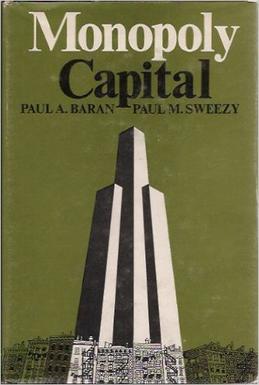
Capitalism is an economic system based on the private ownership of the means of production and their operation for profit. Central characteristics of capitalism include capital accumulation, competitive markets, price systems, private property, property rights recognition, voluntary exchange, and wage labor. In a market economy, decision-making and investments are determined by owners of wealth, property, or ability to maneuver capital or production ability in capital and financial markets—whereas prices and the distribution of goods and services are mainly determined by competition in goods and services markets.

Anti-capitalism is a political ideology and movement encompassing a variety of attitudes and ideas that oppose capitalism. In this sense, anti-capitalists are those who wish to replace capitalism with another type of economic system, such as socialism or communism.
Creative destruction is a concept in economics that describes a process in which new innovations replace and make obsolete older innovations. The concept is most readily identified with the Austrian economist Joseph Schumpeter, who derived it from the work of Karl Marx and popularized it as a theory of economic innovation and the business cycle. It is also sometimes known as Schumpeter's gale. In Marxian economic theory, the concept refers more broadly to the linked processes of the accumulation and annihilation of wealth under capitalism.
Capital accumulation is the dynamic that motivates the pursuit of profit, involving the investment of money or any financial asset with the goal of increasing the initial monetary value of said asset as a financial return whether in the form of profit, rent, interest, royalties or capital gains. The aim of capital accumulation is to create new fixed and working capitals, broaden and modernize the existing ones, grow the material basis of social-cultural activities, as well as constituting the necessary resource for reserve and insurance. The process of capital accumulation forms the basis of capitalism, and is one of the defining characteristics of a capitalist economic system.
In Marxian economics, economic reproduction refers to recurrent processes. Michel Aglietta views economic reproduction as the process whereby the initial conditions necessary for economic activity to occur are constantly re-created. Marx viewed reproduction as the process by which society re-created itself, both materially and socially.
In Marxism, the valorisation or valorization of capital is the increase in the value of capital assets through the application of value-forming labour in production. The German original term is "Verwertung" but this is difficult to translate. The first translation of Capital by Samuel Moore and Edward Aveling, under Engels' editorship, renders "Verwertung" in different ways depending on the context, for example as "creation of surplus-value", "self-expanding value", "increase in value" and similar expressions. These renderings were also used in the US Untermann revised edition, and the Eden and Cedar Paul translation. It has also been wrongly rendered as "realisation of capital".
In Marxian economics and preceding theories, the problem of primitive accumulation of capital concerns the origin of capital and therefore how class distinctions between possessors and non-possessors came to be.

Criticism of capitalism is a critique of political economy that involves the rejection of, or dissatisfaction with the economic system of capitalism and its outcomes. Criticisms typically range from expressing disagreement with particular aspects or outcomes of capitalism to rejecting the principles of the capitalist system in its entirety. Criticism of capitalism is generally a left-wing to far-left stance on political economy.

Monopoly Capital: An Essay on the American Economic and Social Order is a 1966 book by the Marxian economists Paul Sweezy and Paul A. Baran. It was published by Monthly Review Press. It made a major contribution to Marxian theory by shifting attention from the assumption of a competitive economy to the monopolistic economy associated with the giant corporations that dominate the modern accumulation process. Their work played a leading role in the intellectual development of the New Left in the 1960s and 1970s. As a review in the American Economic Review stated, it represented "the first serious attempt to extend Marx’s model of competitive capitalism to the new conditions of monopoly capitalism." It attracted renewed attention following the Great Recession.
Throughout modern history, a variety of perspectives on capitalism have evolved based on different schools of thought.
Non-simultaneity or nonsynchronism is a concept in the writings of Ernst Bloch which denotes the time lag, or uneven temporal development, produced in the social sphere by the processes of capitalist modernization and/or the incomplete nature of those processes. The term, especially in the phrase "the simultaneity of the non-simultaneous", has been used subsequently in predominantly Marxist theories of modernity, world-systems, postmodernity and globalization.
In Marxist theory and Marxian economics, the immiseration thesis, also referred to as emiseration thesis, is derived from Karl Marx's analysis of economic development in capitalism, implying that the nature of capitalist production stabilizes real wages, reducing wage growth relative to total value creation in the economy. Even if real wages rise, therefore, the overall labor share of income decreases, leading to the increasing power of capital in society.
In Karl Marx's critique of political economy and subsequent Marxian analyses, the capitalist mode of production refers to the systems of organizing production and distribution within capitalist societies. Private money-making in various forms preceded the development of the capitalist mode of production as such. The capitalist mode of production proper, based on wage-labour and private ownership of the means of production and on industrial technology, began to grow rapidly in Western Europe from the Industrial Revolution, later extending to most of the world.
In Marxian economics, surplus value is the difference between the amount raised through a sale of a product and the amount it cost to manufacture it: i.e. the amount raised through sale of the product minus the cost of the materials, plant and labour power. The concept originated in Ricardian socialism, with the term "surplus value" itself being coined by William Thompson in 1824; however, it was not consistently distinguished from the related concepts of surplus labor and surplus product. The concept was subsequently developed and popularized by Karl Marx. Marx's formulation is the standard sense and the primary basis for further developments, though how much of Marx's concept is original and distinct from the Ricardian concept is disputed. Marx's term is the German word "Mehrwert", which simply means value added, and is cognate to English "more worth".
The internal contradictions of capital accumulation is an essential concept of crisis theory, which is associated with Marxist economic theory. While the same phenomenon is described in neoclassical economic theory, in that literature it is referred to as systemic risk.

Capital: A Critique of Political Economy, also known as Capital, is a foundational theoretical text in materialist philosophy and critique of political economy written by Karl Marx, published as three volumes in 1867, 1885, and 1894. The culmination of his life's work, the text contains Marx's analysis of capitalism, to which he sought to apply his theory of historical materialism "to lay bare the economic laws of modern society", following from classical political economists such as Adam Smith, Jean-Baptiste Say, David Ricardo and John Stuart Mill. The text's second and third volumes were completed from Marx's notes after his death and published by his colleague Friedrich Engels. Das Kapital is the most cited book in the social sciences published before 1950.
Social ownership is a type of property where an asset is recognized to be in the possession of society as a whole rather than individual members or groups within it. Social ownership of the means of production is the defining characteristic of a socialist economy, and can take the form of community ownership, state ownership, common ownership, employee ownership, cooperative ownership, and citizen ownership of equity. Within the context of socialist economics it refers particularly to the appropriation of the surplus product, produced by the means of production, or the wealth that comes from it, to society at large or the workers themselves. Traditionally, social ownership implied that capital and factor markets would cease to exist under the assumption that market exchanges within the production process would be made redundant if capital goods were owned and integrated by a single entity or network of entities representing society. However, the articulation of models of market socialism where factor markets are utilized for allocating capital goods between socially owned enterprises broadened the definition to include autonomous entities within a market economy.
Marxian economics, or the Marxian school of economics, is a heterodox school of political economic thought. Its foundations can be traced back to Karl Marx's critique of political economy. However, unlike critics of political economy, Marxian economists tend to accept the concept of the economy prima facie. Marxian economics comprises several different theories and includes multiple schools of thought, which are sometimes opposed to each other; in many cases Marxian analysis is used to complement, or to supplement, other economic approaches. Because one does not necessarily have to be politically Marxist to be economically Marxian, the two adjectives coexist in usage, rather than being synonymous: They share a semantic field, while also allowing both connotative and denotative differences.
Crisis theory, concerning the causes and consequences of the tendency for the rate of profit to fall in a capitalist system, is associated with Marxian critique of political economy, and was further popularised through Marxist economics.
Marxism and Keynesianism is a method of understanding and comparing the works of influential economists John Maynard Keynes and Karl Marx. Both men's works has fostered respective schools of economic thought that have had significant influence in various academic circles as well as in influencing government policy of various states. Keynes' work found popularity in developed liberal economies following the Great Depression and World War II, most notably Franklin D. Roosevelt's New Deal in the United States in which strong industrial production was backed by strong unions and government support. Marx's work, with varying degrees of faithfulness, led the way to a number of socialist states, notably the Soviet Union and the People's Republic of China. The immense influence of both Marxian and Keynesian schools has led to numerous comparisons of the work of both economists along with synthesis of both schools.




